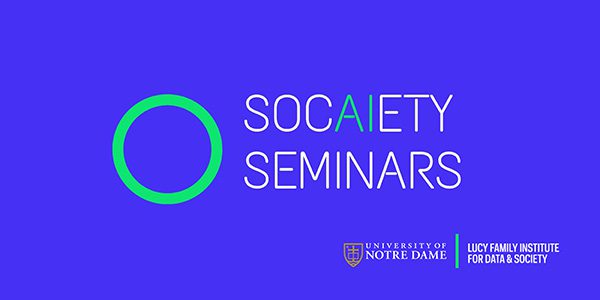The Power of Social Entrepreneurship – Why the business community holds the key to poverty alleviation
Subscribe to the ThinkND podcast on Apple, Spotify, or Google.
Featured Speakers:
- Kimberly Almeida, Director, Worker Well-being, Levi Strauss Foundation
- Frank J. Belatti, Managing Partner, Equicorp Partners, LLC
- Gustavo Pérez Berlanga, Director of Social Responsibility, Gigante Restaurant Group
The third session of The Power of Social Entrepreneurship series began with an introduction by Michael Morris, professor of the practice with the McKenna Center for Human Development and Global Business, welcoming back the virtual community that has been forming over the past two weeks and those that just joined. He provided a brief recap on last week’s session about how entrepreneurship has the power to help those from disadvantaged backgrounds to create and transform many aspects of their lives. Morris then introduced this week’s topic, engaging the private sector to maximize community impact. The session consisted of discussions with private sector partners about why business leaders should care about poverty and how their respective organizations are contributing to poverty alleviation. He also introduced the session’s co-moderators Melissa Paulsen, Associate Director of Entrepreneurship and Education Programs and Keough School Concurrent Assistant Professor of the Practice, and Frank Bellati, Managing Partner, Equicorp Partners LLC.
Paulsen proceeded to introduce the two panelists along with a question for each. First she introduced Kim Almeida, Director of Worker Well-being for the Levi Strauss Foundation, and asked about her background and her definition of corporate social responsibility. Almeida explained her upbringing in Guatemala, being exposed to a lot of factories due to her parents’ occupations as engineers and the tumultuous times the country was going through, and how it led to her passion and work today. She then emphasized the importance of socially responsible businesses in having a system-wide view that understands the interconnectedness of the aspects of sustainability in addressing it. Paulsen then introduced Gustavo Perez Berlanga, Director of Social Responsibility at the Gigante Restaurant Group, and similarly asked about his background and definition of a responsible business. Berlanga noted that once he realized that the people who work in companies can be a force for good, the priorities in his career and personal life changed. He then asked the audience to share if they like coffee and the way they like to drink it. After reading out a few responses, he asked the audience when was the last time they went to order a coffee and asked for one without child labor? This showed that the supply chain, not only of coffee but of so many products, is invisible for the majority of people who consume them, as most consumers are unaware of the atrocities that lie within them, including child labor and exploitation. The supply chains of everything are connected and understanding that consumers play a role in that system is imperative to creating positive change.
Paulsen transitioned to ask Almeida about the business case for social responsibility. Almeida explained that her job has allowed her to humanize the people who work on the products she consumes, it has made these invisible elements of the supply chain visible. She explained that there is value in treating people well in the workplace, the employees become more productive and loyal. The fundamental work experience matters. She proceeded to explain her research study with Harvard and their school of public health to examine the connections between apparel worker well-being in the supply chain and the business impact, which found that a culture of trust, respect, and fairness in factories translated to having a more productive, stable, and loyal workforce. The discussion progressed as Belatti asked Berlanga to comment on how he transitioned from the ‘me’ mindset, which centers on the individual, to the ‘we’ mindset, that recognizes that an organization must be engaged as a community. Berlanga explains the difference in cultures around the world, particularly the Western culture that emphasizes the importance of the individual in contrast to other cultures that are more centered around society as a whole. Berlanga believes that the best philosophy is a balance between the two, as the individual human rights must be respected but remembering that in this society, all decisions and actions affect others. He then asked the question: “When was the last time you took a decision thinking about the people who haven’t been born yet?” This transitioned the discussion to the importance of sustainability and companies taking action that benefit both society and the planet in the long run.
Belatti continued to ask Almeida about a risk that she or her company have taken in an area that has resulted in some positive impact. Almeida described the importance of a company’s common philosophy and set of values in taking risks, as it provides them with a moral compass in decision making. She gave a few examples of this in action throughout Levi Strauss’s history, including the ongoing risk the company took when she joined in 2012 in creating and incorporating the idea of worker well-being. The next big risk she sees the company, as well as all other global supply chains, taking is addressing the inequalities that have been coming to light since the pandemic. Paulsen then asked Berlanga about risks that he has taken where he has made mistakes or has observed. Berlanga discussed an article he wrote called “21 Mistakes in CSR” and proceeded to highlight and delve into two: not putting sustainability at the center of personal and professional decisions and greenwashing, when a company claims to be performing socially responsible actions but in reality are not.
Bellati summarized the discussion up to that point, provided an anecdote on his time as CEO of a company, and posed an important question: when the economic condition is paramount, how do you fight through that to continue to be a champion for social and environmental change? Paulsen transitioned into a Q&A that consisted of the following:
- As a consumer, what are some of the best rating services certifications that we can use to find businesses that are operating in socially responsible ways? How do we counsel people on how to find those companies that are truly acting out their values?
- Can you comment on compensating the livable wage for employees?
Paulsen ended the session by thanking Almeida and Berlanga for joining the discussion and Belatti for co-facilitating and opening the break-out sessions.
- Socially responsible businesses must have a system-wide view. The private sector has often separated the different aspects of social responsibility, including the environmental and social, without realizing how interconnected they are. In order to address any part of sustainability, one must focus on the system as whole and how fully integrated it is. (8:23)
- “When we define socially responsible business, it has to be a system-wide view. And I think what the private sector has perhaps not always focused on is the sort of fully integrated vision. It’s been very siloed.” (Kim Almeida, 8:23)
- “My definition of sustainability is that we have to build a better world in our daily decisions and actions, all the days, all the time. Focus on the three things: the economic, the environmental, and the social…. How can you balance the three and help to build a better world.” (Gustavo Perez Berlanga, 12:26)
- The supply chains of the world are invisible to most people. The human right abuses in them are invisible. This applies to almost everything, as everything is connected. If people understand their part in this system, the interconnectedness of it, and its potential in building a better world, there can be positive change. (15:22)
- People’s fundamental work experience matters. If the workplace has a culture of trust, respect, and fairness, which includes manageable workloads and supportive supervisors, it creates a more productive and loyal workforce. (19:53)
- “What really matters is your fundamental work experience and how you get treated at work. Having a culture of trust, respect, and fairness at work really matters.” (Kim Almeida, 19:53)
- “For me and the company I work for, the best philosophy is a balance between the two [We mindset and Me mindset], where the fundamental rights of the person are respected, such as freedom, and also understanding that we live in a society and we must always think that our decisions and action affect others.” (Gustavo Perez Berlanga, 25:33)
- In a company, having a common set of principles to lean on when risk-taking makes it safer, as it provides a moral compass for people to stand behind and make decisions on. It allows for the creation of a core group of leaders that fundamentally understand that these decisions are part of living your values. (30:58)
- For sustainability to be achieved, there must be both a long term vision and deep understanding of what it means to be sustainable. Both are essential in designing a strategy that contributes to not only short-term goals, but building a better future for the generations to come. (40:21)
- “What is the role and the responsibility of global brands that are part of the system to really make sure that these inequalities are addressed in sustainable ways? I think that’s really where the next big risk-taking will be.” (Kim Almeida, 36:01)
Related Content
Climate Change and The Limits of Narrative
Join the Kellogg Institute for the introductory session of a workshop refining Kellogg Faculty Fellow Roy Scranton’s draft book project “Ethical Pessimism: Climate Change and...
View EventA Brave New World of AI Governance
Explore the connection between data, geopolitics and governance, regulation, self-regulation while discovering examples of good and bad practices in various sectors, such as...
View EventAlgorethics: potentiality and challenges in the age of AI
Explore the possibilities and challenges in ethical governance of AI through algorethics. Algorethics is a term that has been developed since 2018 to denote the need for a study...
View Event

